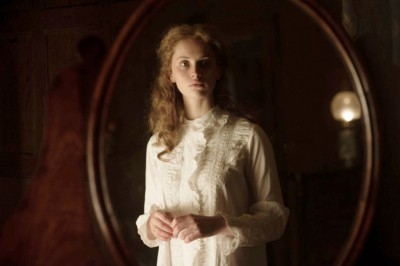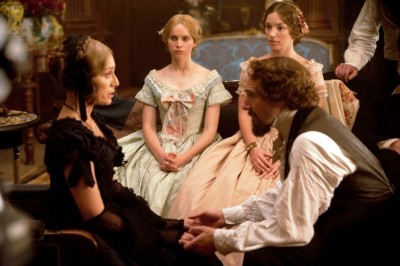
Ralph Fiennes’ second directorial effort, The Invisible Woman, is something of a puzzlement. It’s definitely a more successful work than his first film, Coriolanus (2011), and it’s considerably more interesting. It tells the story of Charles Dickens’ (Fiennes) love affair with Ellen “Nelly” Ternan (Felicity Jones) — an affair that started at the peak of Dickens’ fame and lasted for the remainder of his life. The film takes an unusual approach to the material, working in the most heavily layered manner I’ve seen in a biographical film since Ken Russell’s Mahler (1974). (Interestingly, David Collings, who played Hugo Wolf in Mahler, has a small role here.) The similarity is probably not coincidental — especially considering the imagery — but do not take this comparison too far. The Invisible Woman is no Mahler. It’s a much more deliberately paced (frankly, it’s rather slow) and reticent film. It is, if anything, too genteel and respectable for its own good, which is something of a curiosity given the material.

The Invisible Woman is good. Make no mistake about this. It’s solidly produced, beautifully photographed and wonderfully acted. Fiennes proves himself more interested in making a good movie than he is in showcasing his own performance. His Dickens is certainly compelling — his public reading from David Copperfield is mesmerizing — but the film mostly belongs to his co-star, Felicity Jones. That’s not gallantry, since the title tells you that the story is more about this shadowy figure in Dickens’ life than it is about Dickens himself. It’s the story of a woman who found herself in love with a famous married man and proceeded to enter into a long, more or less secret relationship with him, knowing it could never end well. She sees the relationship as analagous to the supposedly happy — but really very ambiguous — second ending of Great Expectations.

The film is actually about a good deal more than Nelly’s invisibility. It constantly comments on the position of all women in Victorian society — something Nelly’s mother (Kristin Scott-Thomas) tries to impress on her daughter. Catherine (Brit TV actress Joanna Scanlan in a heartbreaking performance), may be his wife, but Dickens is quite able to simply blot her out of his mind. (There’s even a perhaps too literal scene of a wall being constructed between them.) For all his talk about smashing the way the world works, Wilkie Collins (Tom Hollander, About Time) keeps his mistress out of the picture as much as possible, which suggests that his idea of a new world is more for men than for women. Dickens himself seems to echo this view in his relationship with Nelly. There is a singularly telling scene where Nelly is loudly reproaching Dickens on a street, and all a passing policeman wants to know is whether this lady is bothering Mr. Dickens. There’s only one side to the story in Victorian England.
-large-picture_thumb.jpg)
Though The Invisible Woman is a good, surprisingly complex and thoughtful film — it is about as far as it’s possible to get from “action-packed.” The movie doesn’t hurry along in any sense. It is more interested in arriving at a cumulative impact — and it does have one, if you have the patience to get there. Fiennes makes a few dubious choices. There’s a bit too much hand-held camera in some scenes — something that is out of place with the tone of the film. And too many scenes play out in hushed tones, long pauses and even longer silences. When Fiennes uses music, he uses it well. The problem is he doesn’t use it often enough. These are all legitimate drawbacks to the film, but they don’t keep it from being a worthwhile work. Rated R for some sexual content.
Starts Friday at Carolina Cinemas.




Before you comment
The comments section is here to provide a platform for civil dialogue on the issues we face together as a local community. Xpress is committed to offering this platform for all voices, but when the tone of the discussion gets nasty or strays off topic, we believe many people choose not to participate. Xpress editors are determined to moderate comments to ensure a constructive interchange is maintained. All comments judged not to be in keeping with the spirit of civil discourse will be removed and repeat violators will be banned. See here for our terms of service. Thank you for being part of this effort to promote respectful discussion.